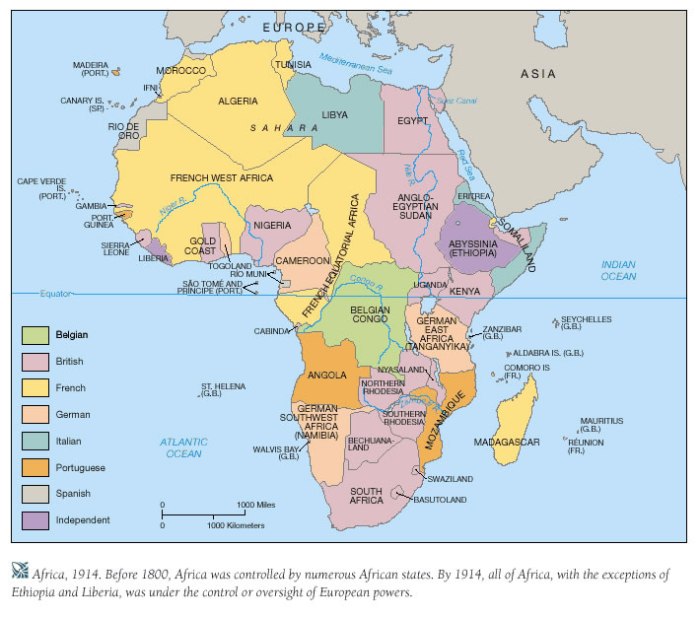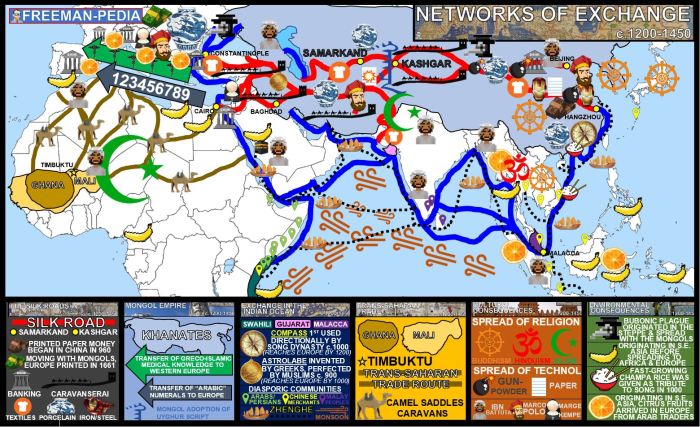Bananas in africa ap world history – Bananas in Africa: A History of Cultivation, Trade, and Cultural Significance
Bananas, a staple crop in Africa for centuries, have played a significant role in the continent’s history, from sustenance and nourishment to economic development and cultural practices. This comprehensive exploration delves into the multifaceted story of bananas in Africa, examining their cultivation, trade, colonial impact, post-colonial challenges, cultural significance, nutritional value, and the effects of climate change.
Banana Cultivation in Africa: Bananas In Africa Ap World History
Bananas have a rich history in Africa, where they have been cultivated for centuries. As a staple crop, bananas provide essential nutrition and sustenance for millions of people across the continent. The environmental conditions and agricultural practices employed by African farmers have significantly influenced banana production and shaped the crop’s significance in the region.
Historical Overview
Bananas were introduced to Africa from Southeast Asia around 500 BCE. They quickly gained popularity due to their adaptability to the continent’s diverse climates and soils. Over time, African farmers developed local varieties and cultivation techniques that optimized banana production.
These practices included intercropping, mulching, and the use of organic fertilizers.
Significance as a Staple Crop
Bananas are a crucial staple crop in many African countries, particularly in the Great Lakes region and West Africa. They provide a rich source of carbohydrates, potassium, and vitamins. The fruit is consumed fresh, cooked, or processed into various products such as flour, juice, and beer.
Bananas also serve as a vital source of income for smallholder farmers.
Environmental Factors and Agricultural Practices
The success of banana cultivation in Africa is influenced by several environmental factors. The crop thrives in warm, humid climates with well-drained soils. Rainfall patterns and temperature fluctuations play a crucial role in determining the yield and quality of bananas.
African farmers employ various agricultural practices to enhance banana production, including irrigation, fertilization, and pest and disease management.
Bananas and the Trans-Atlantic Slave Trade

Bananas played a significant role in the trans-Atlantic slave trade. Enslaved Africans relied heavily on bananas as a source of sustenance and nourishment during the harrowing Middle Passage and on plantations in the Americas. The fruit provided essential vitamins, minerals, and energy to those who endured the horrors of slavery.
Source of Sustenance
Bananas were a vital source of food for enslaved Africans during their journey across the Atlantic. The fruit’s portability and high nutritional value made it an ideal sustenance for those who were often subjected to starvation and malnutrition.
Impact on Distribution and Cultivation
The slave trade significantly impacted the distribution and cultivation of bananas in Africa. As enslaved Africans were transported to the Americas, they carried banana plants with them, introducing the crop to new regions. This led to the establishment of banana plantations in the Caribbean, Central America, and South America.
Bananas and Colonialism

European colonialism had a profound impact on banana production in Africa. The demand for bananas in Europe fueled the establishment of large-scale banana plantations in African colonies. These plantations were often owned and operated by European companies, which exploited cheap labor and disrupted traditional farming practices.
Economic Consequences
Colonial banana plantations generated significant profits for European companies, but the benefits did not trickle down to African farmers. The plantations often displaced local communities and disrupted traditional farming systems, leading to economic hardship and social inequality.
Environmental Consequences
The establishment of large-scale banana plantations had significant environmental consequences. The intensive use of pesticides and fertilizers led to soil degradation and water pollution. Deforestation for banana cultivation also contributed to habitat loss and biodiversity decline.
Bananas and Post-Colonial Africa

After independence, African countries faced challenges and opportunities in banana production. The legacy of colonialism and the emergence of global trade agreements shaped the development of the banana industry.
Challenges
Post-colonial African countries faced challenges such as lack of infrastructure, limited access to technology, and competition from multinational corporations. These factors hindered the development of a sustainable and competitive banana industry.
Opportunities
Despite the challenges, bananas continued to play a vital role in post-colonial Africa. Governments and international organizations invested in research and development to improve banana productivity and quality. Fair trade initiatives emerged to promote equitable distribution of benefits from banana cultivation.
Bananas and Cultural Significance
Bananas hold immense cultural significance in African societies. The fruit is deeply intertwined with traditions, rituals, and folklore. Bananas are used in ceremonies, festivals, and as symbols of fertility and prosperity.
Traditional Ceremonies
Bananas are often used in traditional ceremonies and rituals. For example, in some West African cultures, bananas are used as offerings to ancestors and deities. In East Africa, bananas are used in marriage ceremonies to symbolize fertility and abundance.
Art, Music, and Literature, Bananas in africa ap world history
Bananas have inspired artists, musicians, and writers across Africa. The fruit’s shape, color, and taste have been depicted in paintings, sculptures, and songs. Bananas have also been featured in traditional stories and folktales.
Q&A
What is the significance of bananas in African history?
Bananas have been a staple crop in Africa for centuries, providing sustenance, nourishment, and economic opportunities.
How did bananas contribute to the trans-Atlantic slave trade?
Bananas were a source of sustenance and nourishment for enslaved Africans during the trans-Atlantic slave trade.
What was the impact of colonialism on banana production in Africa?
Colonialism led to the establishment of large-scale banana plantations in Africa, with significant social, economic, and environmental consequences.
What are the challenges facing banana production in post-colonial Africa?
Post-colonial Africa faces challenges such as pests, diseases, and climate change, which impact banana production.
What is the cultural significance of bananas in African societies?
Bananas hold cultural significance in African societies, featuring in traditional ceremonies, rituals, folklore, art, music, and literature.